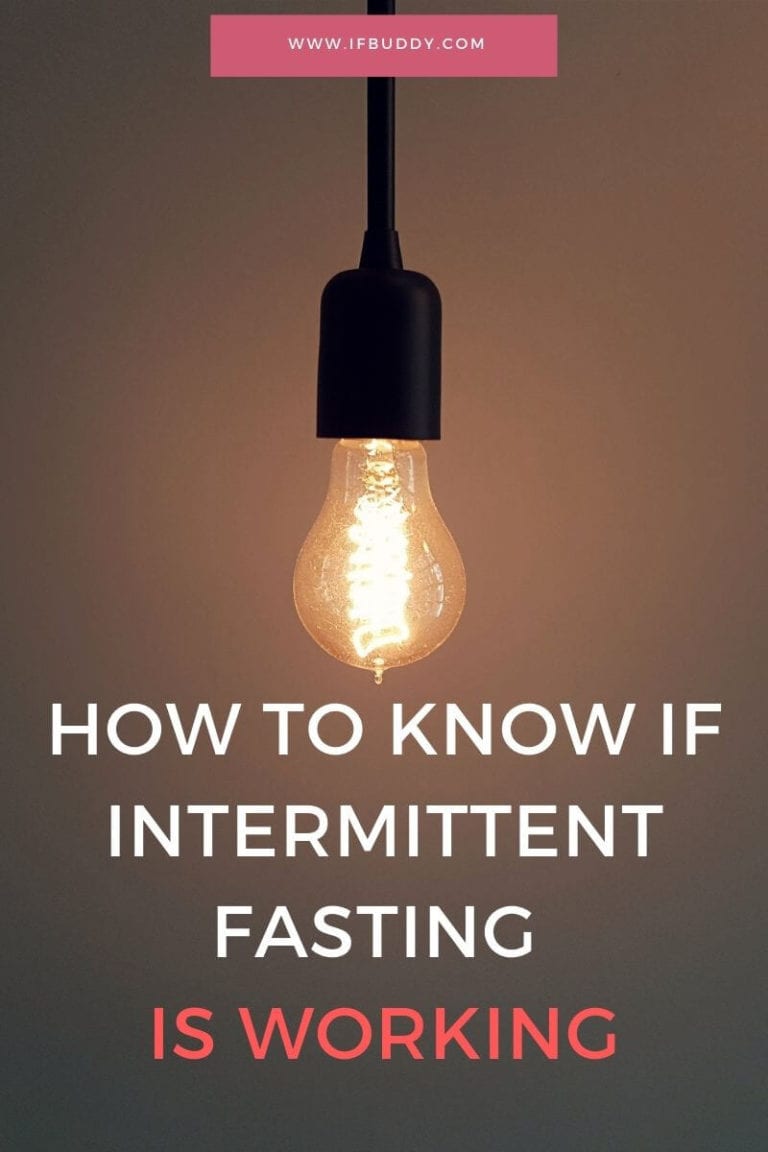You decided to start intermittent fasting. You chose your method, maybe you created a meal plan to help you minimize cravings and you planned your workouts. But how to know if intermittent fasting is working? You’ve been doing it for a while, you think you’re seeing some results, but you’re not quite sure if it’s working.
The answer depends mostly on your goals. If you’re on this journey to lose weight, you may think the scale is the best measurement. This is not always true. If you’re also working out, you might be gaining muscle and losing fat, so other measurements, such as your waist circumference will be better at indicating results. The Health benefits of intermittent fasting may take weeks or even months to be visible. However, if you find you’re having more energy, sleeping better, you find it easier to focus on your tasks during the day, and have better blood sugar management, it means intermittent fasting is working.
Let’s dive deeper into this topic and explore all the signs that show you how to know if intermittent fasting is working for you.
Indicators that intermittent fasting is working
Here’s a quick list of signs that show you intermittent fasting is working:
- You’re losing weight at a slow to moderate pace. How much weight you lose will depend on the number of calories you’re eating and how much you workout. A healthy pace for a normal intermittent fasting diet is 1-2 pounds per week or 4-8 pounds a month. It may sound very little, but it is healthy and it is a sign your new diet is working.
- You have more energy. In the first few days or even a week, you may feel a bit sluggish during your fast. That usually happens either because you’re not eating enough during your eating window or it may simply be your body adjusting to the new lifestyle. Once this adjustment takes place, you should start having more energy.
- You’re falling asleep easily and you have a restful sleep.
- You have better blood sugar management. In other words, you don’t have (or have less) blood sugar crashes. Those who are type 2 diabetic and are measuring their blood sugar levels, should see more stable results.
- If you’re measuring insulin, you should start seeing better fasting insulin levels.
- You find it easier to focus on day-to-day activities.
- If you’re working out, you should start having more energy and strength during your workouts. You may also start building muscles and losing fat, which where measurements other than your weight must come into play if you want to see your real progress.
Keep in mind that most of these aren’t results you’ll see within a few days. On the contrary, you’ll need to do intermittent fasting for a few weeks or even months to see proper results. Again, it depends on the goals and the indicators you’re looking at. For instance, if you’re looking at weight loss, you should start losing 1-2 pounds per week immediately. Energy levels and sleep quality may take 2-3 weeks because your body needs to adjust to the new lifestyle first.
How much weight can you lose with intermittent fasting in a month?
The answer depends first and foremost on how many calories you’re eating and how much you’re exercising. Taking as an example the most common intermittent fasting method, the 16/8 method, most people will skip one meal each day, usually breakfast. If you normally had a mid-morning snack, that will also be skipped with this method. Unless you’re overeating at lunch, dinner, and the snacks in between, you should already be at a caloric deficit. Add it that a workout 3-4 times a week and you should have no problems losing 1-2 pounds per week or 4-8 pounds a month.
Is it possible to lose more? It is, but keep in mind that losing a lot of pounds each week is not healthy and it is not sustainable, you risk gaining it all back sooner or later. That being said, the exact number of pounds lost will vary slightly from person to person, depending on other factors such as your age, your activity level, any conditions you may have that could influence your metabolism. Dieting history is also an important factor. For instance, someone with a long history of restrictive, yo-yo diets will find it harder to lose weight than someone who’s never been on a diet before.
How can you get the best results with intermittent fasting?
As with anything, consistency is key. Find a method that works for you, for your lifestyle, one that is easy to integrate with your job and other daily activities, and stick to it.
Make sure you eat enough calories. If you’re desperately trying to lose weight, it could be easy to think you’ll create a huge caloric deficit and melt the pounds in a few weeks. That’s not a sustainable lifestyle. Intermittent fasting isn’t a fad diet and you shouldn’t look at it as something you’ll do for a few weeks to lose a few pounds. It is first and foremost a lifestyle aimed at helping you stay healthy. Because you’re skipping 1-2 meals each day, you’re already at a caloric deficit, so try to eat normally during your eating window.
Another thing to remember, regardless of the reason why you start this journey, is that for the best results you need to eat healthily. Many people think that if they fast, they will automatically see all the benefits of this diet. While it’s true that fasting in itself has benefits, for the best results, you’ll need to eat a healthy, balanced diet. Junk food is still junk food, no matter how much you fast!
Don’t rely solely on dieting. Exercising is just as important for your health and it will help you maximize your results. You don’t need to go do the craziest, strongest workouts if you don’t want to. Start small with easy exercises and build gradually from there, I recommend HIIT. Just make sure you’re staying active.
Is dirty fasting just as effective as normal fasting?
The differences between dirty fasting and normal fasting
With normal intermittent fasting, like the 16/8 method, you’re not allowed to eat anything during the 16 hours of fasting. You can drink water, unsweetened tea, or coffee but nothing else. You should stay away from anything that could cause an insulin reaction, which includes calorie-free artificial sweeteners. Most people who swear by this method also forbid the consumption of any fats, such as MCT oil which is added to coffee, even if these fats won’t spike your blood sugar.
With dirty fasting, you’re allowed to use some artificial sweeteners (calorie-free) and you’re also allowed things like creamer or MCT oil in your coffee. This fasting method also allows things like bone broth, which is a great source of vitamins, minerals, and especially electrolytes.
Is dirty fasting effective?
Like most things when it comes to diets, it depends on the person. The vast majority who try dirty fasting find it just as effective as normal fasting. Some go as far as saying it is better for them. That’s because some people find it very difficult to adjust to the no-calorie period. Whether that is because of blood sugar issues or a very active lifestyle, they can’t go so many hours without any energy source. In this case, trying to fast for many hours will most likely come with some side effects: you might experience symptoms of low blood sugar, feel sluggish, and you’ll find it difficult concentrating on normal activities and you might overeat.
When the latter happens, fasting won’t be very effective for very long. And even if you do manage to not overeat, you’ll still have a hard time seeing any progress or health benefits. This is where dirty fasting becomes more effective than normal fasting. By adding some calories that have a minimal impact on blood sugar, you’re giving your body a source of energy that will then help you eat healthily and stick to your fast until the end.
However, if you’ve started directly with dirty fasting and results aren’t showing up, you may be among those who don’t do well on this type of diet. Try normal intermittent fasting instead and see how you feel.
Wrapping it up
So, how to know if intermittent fasting is working? The answer is found in another question: are you making progress? If the answer is yes, intermittent fasting is working for you. If you find intermittent fasting too hard, you should consider some of these options to make it easier.
Be careful about how you define progress. People often start a new lifestyle with a clear goal in their minds, which is great. The problem appears when you start to forget to celebrate the milestones, the progress you make on the way to the goal. So ask yourself things like: ‘do I have more energy?’, ‘do I sleep better?’, ‘am I finding it easier to manage hunger cues?’, ‘am I losing weight OR inches?’. If you answered yes to one or more of these questions, you’re making progress, so intermittent fasting is working.

